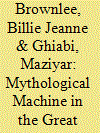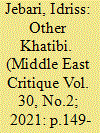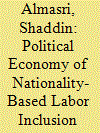|
|
|
Sort Order |
|
|
|
Items / Page
|
|
|
|
|
|
|
| Srl | Item |
| 1 |
ID:
180014


|
|
|
|
|
| Summary/Abstract |
This article analyzes the states of Iran and Egypt before the eruption of revolutionary processes in those countries in 1979 and 2011 respectively. Its aim is to delineate the different roles of the armies as the last lethal and organized bastions of dictatorships during those revolutions. In Egypt, the army successfully protected the Egyptian state from a complete downfall, while in Iran, the army became completely disorganized and shattered. It argues that the extreme personal rule of Iran’s shah [king] within a neo-sultanic framework and his extreme depoliticization of the army rendered it unable to act independently during a revolutionary process. In contrast, the distribution of power between the army and presidential palace within an institutionalized dual military state enabled the army to play a much more definitive role during the revolutionary process in Egypt. Consequently, unlike in 1979 Iran, the army in 2011 Egypt not only saved the pre-revolutionary military dictatorship but restored it in a much more brutal way.
|
|
|
|
|
|
|
|
|
|
|
|
|
|
|
|
| 2 |
ID:
180010


|
|
|
|
|
| Summary/Abstract |
The article revisits ‘sectarianism’ as an epistemic venue within the context of a Great Civil War in the Middle East (2001-2021), a label that includes the overarching narratives of political life in the aftermath of 9/11 up to the aftermath of the so-called ‘Arab Spring.’ By introducing the notion of the ‘mythological machine,’ it argues that ‘sectarianism’ is a myth, something that does not exist in real terms, but which has real world effects. The mythological machine is a device that produces epiphanies and myths; it is a gnoseological process, which has cultural, social and political effects through the generation of mythological facts and, as a machine, it does so through both guiding and automatized mechanisms. Through this interpretive shift, the article proceeds through several theoretical steps using a variety of cases from across West Asia and North Africa, contextualizing them within global political events. Firstly, the article argues that it is ‘civil war,’ shaped by the work of the mythological machine that governs state-society relations and transnational politics in the Middle East. Then, the article discusses how the mythological machine incorporates a semantic othering via mythological thinking, speak and practice that shapes the perception and experience of civil wars. To conclude, the article discusses how the mythological machine displaces people’s status in the context of civil wars leading to the emergence of new forms of belonging and nation-making. Ultimately, the mythological machine creates what Giorgio Agamben defines as a state without people, a condition exhausting the value of citizenship and the political.
|
|
|
|
|
|
|
|
|
|
|
|
|
|
|
|
| 3 |
ID:
180011


|
|
|
|
|
| Summary/Abstract |
The recent revival of interest in Moroccan thinker Abdelkebir Khatibi (1938–2009) around the English release of his seminal 1983 essay, Maghreb Pluriel represents an opportunity to place this thinker in the inner circle of post-1967 Arab thought. This article argues that most coverage and commemoration of him has been devoted to a glorified side of his trajectory that fits neatly within the framework of ‘postcolonial francophone intellectuals.’ However, this article argues that we must revise the meaning of his seminal book and his call for a ‘plural Maghreb’ to see it also as the demise of his project for a decolonized sociology in Morocco, which was necessary to set his sights toward semiology and his significant literary oeuvre. His example informs us on Arab intellectual strategies after the end of grand ideological narratives, and how to write Arab intellectual and cultural histories without succumbing to the trap of nostalgia.
|
|
|
|
|
|
|
|
|
|
|
|
|
|
|
|
| 4 |
ID:
180013


|
|
|
|
|
| Summary/Abstract |
In a setting of protracted refugee crises, donor responses increasingly have taken on experimental development approaches. One such aid experiment is that of the Jordan Compact, drafted in February 2016. This aimed to turn the Syrian refugee crisis in Jordan into a development opportunity, by fostering job creation and harvesting skills of displaced populations. This brought with it attention from donors in the form of political interest and, more importantly, funding, to stimulate the local economy and labor markets. However, the implementation of this plan was problematic: It focused only on stimulating jobs for Syrians and Jordanians, with little attention given to existing labor market dynamics and other employed nationality groups. Using a qualitative approach informed by both desk research and key informant interviews, this article shows that the policies undertaken have formed a nationality-based prioritization strategy that sought to improve Syrian labor market access over that of other non-Jordanians. The Compact did little to address genuine job creation or social protection, focusing on boosting permit numbers while worsening non-Syrian migrant and refugee access to protection in formal work.
|
|
|
|
|
|
|
|
|
|
|
|
|
|
|
|
| 5 |
ID:
180012


|
|
|
|
|
| Summary/Abstract |
Richard Rorty’s controversial works in various areas of epistemology, language, politics and philosophy have drawn intellectual attention worldwide. In Iran, Rorty’s own distinctive way of thinking has attracted the attention of intellectual and philosophical circles. This article explores how his thought as received by Iranian intellectuals has contributed to the development of their ongoing debate on tradition and modernity. A few Iranian intellectuals have tried to find in Rorty’s ideas a solution to what they perceive as their own society’s problems. In particular, they believe his notion of anti-foundationalism and his idea of the priority of democracy to philosophy are ways to reconcile their own traditional philosophical and doctrinal conceptions with modern democratic institutions.
|
|
|
|
|
|
|
|
|
|
|
|
|
|
|
|
|
|
|
|
|